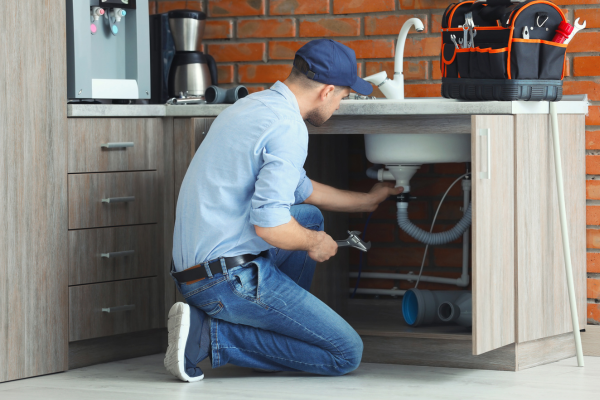Seasonal changes can significantly impact the operation and durability of commercial plumbing systems. From freezing temperatures in the winter to the stresses of high water usage during summer, each season presents unique challenges for business owners. Understanding how weather conditions affect plumbing systems and implementing preventative measures can save your business from costly repairs and downtime.
Common Seasonal Weather Challenges for Plumbing
Fluctuating temperatures and weather extremes can take a toll on commercial plumbing systems. During colder months, freezing temperatures can cause water to freeze inside pipes, leading to cracks or burst pipes that disrupt business operations. Similarly, rapid temperature changes in spring and fall can cause pipes to expand and contract, weakening connections over time.
Heavy rainfall during certain seasons can overwhelm drainage systems, causing backups and flooding. This issue is particularly problematic for businesses with older plumbing systems that may not be equipped to handle sudden increases in water volume. Seasonal weather can also lead to sediment buildup in pipes due to fluctuating water quality, restricting water flow and increasing the risk of clogs.
Another challenge arises from prolonged exposure to extreme heat or cold, which can weaken pipe materials over time. For example, metal pipes exposed to cold weather are prone to corrosion, while certain plastic pipes such as CPVC can become brittle in freezing conditions or warp during intense heat. These gradual changes may not be immediately noticeable but can lead to unexpected plumbing failures if left unaddressed. Businesses must remain proactive in monitoring the health of their plumbing systems to mitigate these risks.
These seasonal challenges are unavoidable but manageable with proper planning and regular maintenance. Business owners need to stay vigilant and work with professional plumbers to address potential issues before they escalate.
Winter Impacts on Commercial Plumbing
Cold weather poses significant risks to commercial plumbing systems, with frozen pipes being one of the most common issues. When water inside the pipes freezes, it expands, increasing pressure and potentially causing the pipe to crack or burst. This can lead to costly repairs and water damage as well as downtime for businesses that depend on running water for daily operations. Proper insulation and maintaining a consistent indoor temperature are essential steps to prevent this problem.
Snow and ice accumulation around plumbing components, such as outdoor pipes or drains, can also create challenges. Blocked drains may prevent water from flowing away properly, increasing the risk of flooding during snowmelt. Businesses located in areas prone to heavy snowfall should regularly clear drains and inspect plumbing systems to ensure they can keep operating throughout the season.
Another concern during winter is the strain on water heaters due to increased demand. Commercial water heaters may need to work harder to deliver hot water, especially in colder climates where the incoming water temperature is much lower. Without regular maintenance, this extra workload can shorten the lifespan of the water heater or lead to malfunctions. Scheduling pre-winter servicing for water heaters and other critical plumbing components can help prevent unexpected breakdowns during the busiest times of the year.
Summer and Warm Weather Plumbing Concerns
Summer heat can lead to unique plumbing challenges for commercial properties. High temperatures can cause pipes to expand, potentially leading to leaks or bursts, especially in older systems. Increased water usage during the summer months, such as for irrigation or cooling systems, often makes this situation worse by putting additional pressure on plumbing infrastructure. Regular inspections and monitoring can help detect early signs of stress on the system before it escalates into costly repairs.
Another issue during summer is the strain on sewer lines due to heavy rainfall and storms. Intense downpours can overwhelm drainage systems, causing backups and potential flooding in low-lying areas of the property. Businesses should ensure that gutters, roof drains on flattop buildings, and storm drains are clear of debris to help direct water away from the building. Additionally, letting a commercial plumber install sewage backflow prevention devices can reduce the risk of sewage backing up into the property.
In some regions, summer also brings challenges related to hard water. Increased evaporation during warmer months can concentrate minerals like calcium and magnesium in the water supply, leading to a more rapid buildup of scale in pipes and fixtures. This can reduce water flow, increase energy costs, and shorten the lifespan of equipment like water heaters. Regular water treatment or descaling measures can mitigate these effects and promote smooth operation during peak summer months.
Preventative Measures for Seasonal Plumbing Issues
Taking proactive steps to address seasonal plumbing concerns can save businesses significant time and money. Insulating pipes is one of the most effective measures, especially for areas prone to freezing temperatures. Insulation materials, such as foam or fiberglass, help regulate pipe temperature and reduce the risk of freezing during the winter months. Additionally, scheduling routine inspections before the change of seasons allows professionals to identify and address vulnerabilities, such as small leaks or weak pipe joints, before they escalate into larger problems.
For summer and rainy seasons, ensuring proper drainage is critical. Regularly cleaning gutters, downspouts, roof drains, and storm drains can prevent clogs that lead to flooding. Installing sump pumps and backup sump pumps in basements or low-lying areas can provide an added layer of protection against water damage. Businesses located in areas with hard water may also benefit from water softeners or filtration systems to reduce the risk of mineral buildup, which can damage pipes, fixtures, and equipment over time.
Educating employees about basic plumbing care and seasonal precautions is another preventive measure to consider. For instance, encouraging your team to report small leaks, running urinals & toilets, or slow drains early can prevent these issues from worsening. Businesses can also establish clear protocols for winterizing outdoor plumbing fixtures or monitoring water usage during the summer months to avoid overloading the system. Combining professional maintenance with day-to-day vigilance creates a comprehensive approach to keeping plumbing systems functioning smoothly year-round.
Don’t Let Your Plumbing Get Under the Weather
Seasonal weather can have a profound impact on commercial plumbing systems, but with proper preparation and maintenance, businesses can avoid costly disruptions. From winter freezes to summer storms, understanding the unique challenges of each season is the first step toward protecting your plumbing. Don’t let plumbing issues disrupt your business! Schedule a plumber online now to ensure your commercial property runs smoothly.



